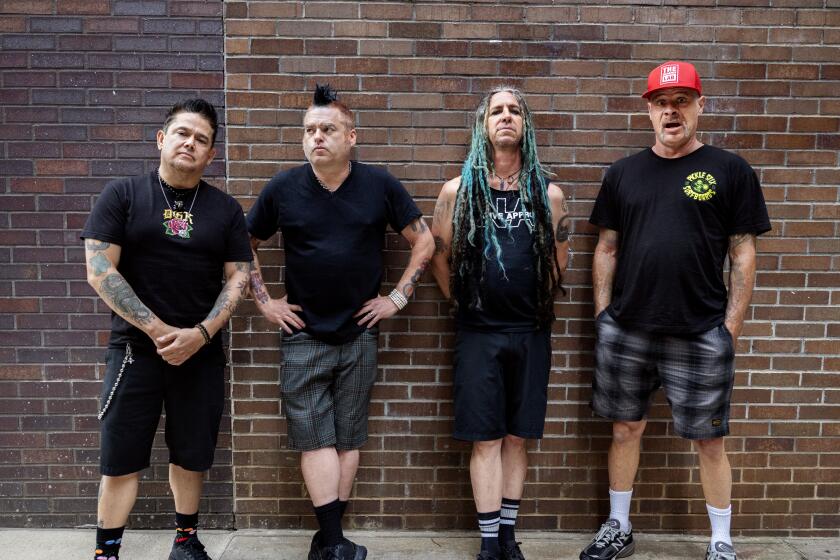Jackson, Alleged Victim Reportedly Near Settlement : Lawsuit: Singer may pay boy millions in molestation case, sources say. Criminal charges could still be filed.
Attorneys for Michael Jackson and a 14-year-old boy who says the singer sexually molested him are near a settlement of the boy’s lawsuit and hope to announce Tuesday that the case has been resolved, sources familiar with the negotiations said Sunday.
Rumors of an impending settlement have swirled around the case since Jan. 14, when lawyers for both sides met in chambers with Superior Court Judge David Rothman. Afterward, the judge said the attorneys had agreed to halt their public comments on the case.
Since then, a number of reports and courthouse rumors have suggested that a deal was in the works. A London tabloid reported last week that Jackson had agreed to pay at least $40 million to the boy, while Time magazine will report this week that the figure is closer to $5 million.
Sources told The Times that the deal is for “eight figures”--somewhere between $10 million and $100 million--but would not elaborate. Negotiations continue, they said, adding that talks have not revolved around the amount of the settlement but around other issues concerning resolution of the civil case.
Larry R. Feldman, the boy’s lawyer, did not return phone calls Sunday. Howard Weitzman, a lawyer for Jackson, was unavailable for comment.
Motions in the case are scheduled to be heard Tuesday, and if a deal is not made by that time, the courtroom session will go ahead, sources said. On the other hand, if both sides resolve the lingering issues, the lawyers are expected to announce at that session that the case has been settled. They are not expected to disclose details of any settlement.
Of particular interest to police, sheriff’s deputies and prosecutors from Los Angeles and Santa Barbara counties is what effect a settlement might have on their criminal investigation into allegations that Jackson sexually molested the boy over a period of about four months last year. Investigators have interviewed dozens of witnesses--including the alleged victim--as part of that probe.
Legal experts said no written agreement could prevent the boy from testifying against Jackson in a criminal case. Drafting such an agreement could be construed as obstructing a criminal investigation and could be punishable under legal provisions that preclude anyone from “compounding a crime.”
Moreover, under California law, minors can be and sometimes are required to testify against their will. The law includes an exception for adult or juvenile victims of sex crimes, however, so the boy in this case probably could not be forced to take the stand if he decided against it, legal experts said.
Just as important as the law, however, is a practical question: If the boy were to refuse to testify in the criminal case, would prosecutors be willing to force him to the stand to press their case against Jackson?
“That’s a difficult call,” said Harland Braun, an experienced criminal lawyer and former deputy district attorney. “There are two considerations here: You prosecute crimes partly for the victims, but also to protect the public.”
For Jackson, ending the civil case would at the very least remove him from a proceeding that has damaged his career and, according to the entertainer and his advisers, taken a toll on his health. Jackson abruptly ended a world tour last year, claiming that the allegations and recent scalp surgery had caused him such stress that he became addicted to painkillers.
At that time, one of Jackson’s lawyers, Bertram Fields, said the singer was “barely able to function adequately on an intellectual level” and would require at least six to eight weeks of treatment at an undisclosed location overseas. Jackson returned to the country four weeks later and publicly proclaimed his innocence in a nationally televised statement from his Los Olivos ranch, known as Neverland.
In recent weeks, the legal pressure against Jackson has mounted, as the boy’s lawyer has pressed the civil case on several fronts. On Jan. 10, Feldman filed a motion seeking access to Jackson’s financial records, and he attached to that motion a number of excerpts from depositions taken as part of the lawsuit.
In those depositions, a former maid for Jackson spelled out what she said were several instances in which she saw the entertainer naked with young boys. Other employees and former employees described a security system that alerted Jackson whenever someone approached his bedroom, and one former secretary acknowledged that she told police Jackson was a pedophile, though she added that she regretted and disavowed those comments.
Although Jackson’s lawyers had sought to prevent release of the depositions to the public or prosecutors, Rothman overruled that motion. As a result, the information learned in the civil case is available to prosecutors considering whether to bring criminal charges.
More to Read
The biggest entertainment stories
Get our big stories about Hollywood, film, television, music, arts, culture and more right in your inbox as soon as they publish.
You may occasionally receive promotional content from the Los Angeles Times.











